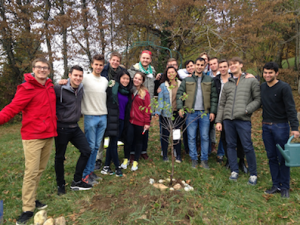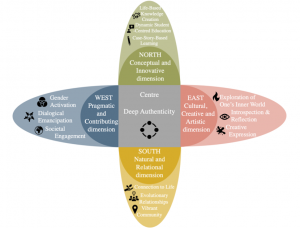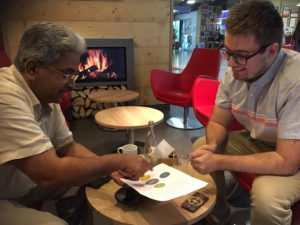Christophe Haesler, Junior Fellow of Trans4m, focused on Authenticity in Education and especially on the case of Trans4m’s Transformative Course “Becoming an Agent of Transformation: Towards Integrated Self Development” as an Integral Curriculum for Young Adults seeking to find their Authentic Voice and to contribute to an Authentic Culture in Swiss Society.
Calling: Authentic Education in and for an Authentic Society
The burning issue underlying my (Christophe Haesler‘s) research-to-innovation was to explicitly reveal and unleash the potential of authentic education. Following these thoughts, the objective of the six months project was in particular, through this integral thesis, to focus on the critical analysis and evolution of Trans4m’s transformative course ‘Becoming an Agent of Transformation: Towards Integrated Self Development’ (AoT) as an integral curriculum for young adults seeking to find their authentic voices and to contribute to an authentic culture in society. This research-to-innovation journey was aimed at exploring how an authentic education can enable the authentic expression and contribution of students in an authentic society. Education supports, thereby, the holistic human development of students.
Innovation Ecosystem: Comprised of Local and Global Actors
In order to comprehensively analyse and evolve Trans4m’s transformative course, a strong innovation ecosystem team was built up that comprised of local and global actors. I have attended and actively assisted in both courses that Trans4m offers at the University of St. Gallen, which allowed me to obtain invaluable insights and in-depth knowledge. I was therefore able to critically analyse both curricula and present concrete insights for its further evolution. My innovation ecosystem consisted of the students that attended both courses and of former students that attended the courses in previous years. Furthermore, Alexander Schieffer was also part of the group as the main catalyst of the ID course and of the AoT course along with Rama Mani. Regarding the organisational level, I used the case of Sarvodaya, a globally recognised holistic development movement, to which I briefly applied my authenticity framework as well. Overall, my innovation ecosystem helped me to pave the road not only for developing the key concept base of this research-to-innovation, but also for any further evolution of engagement in the field of authenticity in education.
Integral Innovation: Towards an Integral Model of Authenticity in Education
The Integral Research design was used as a transformative process to bring about integral innovation. I developed in this research-to-innovation journey an adaptation of the Integral Worlds model as a framework for reviewing, dialoguing with, evolving and releasing authenticity on a self-society level. I introduced an integral model for an educational design as an expression of transformative education promoting personal and societal authenticity. In this part, I want to offer a meaningful and cohesive solution with the goal of contributing to unleashing the potential and GENE-ius of Swiss students, and co-creating a curriculum that allows young adults to find their authentic voices and to participate in the creation of an authentic culture. For this purpose, an authenticity framework was developed that serves the needs of young adults and permits them to construct an authentic culture. Indeed, as authenticity is a complex and highly qualitative notion, I offer a qualitative, reflection-based lens that helps to evolve and increase authenticity on the individual and societal level. The framework follows the five core human modes and is divided into five different integral dimensions. This model builds on the Integral Worlds knowledge field. The integral approach provides a “living mirror” whereby the wholeness of a social system (such as a human being) can be mirrored, interpreted and analysed. Indeed, one needs to take all dimensions of the self and of the personality into consideration. Moreover, I present three qualities that are related to being authentic for each integral dimension. An individual can then evaluate his or her level of authenticity. This framework also allows for a comprehensive perspective to critically reflect upon the level of authenticity of an educational course.
Integral Impact
The culmination of the research-to-innovation thesis was when I was able to put my integral and emancipatory model on authenticity in education into practice. My authenticity framework is applied to the ‘Becoming an Agent of Transformation: Towards Integrated Self Development’ (AoT) course (in hindsight) and to the ‘International Development – Future-orientated Integrated Development Work in Theory and Practice course’ (ID) – (in real time). I have attended and actively assisted both courses, which allowed me to obtain invaluable insights and in-depth knowledge. I was therefore able to critically analyse both curricula and present further evolution potential.The critical reflection on the AoT and the ID course will help strengthen the impact of both courses on students willing to co-create an authentic society. Moreover, the AoT and ID courses are part of a broader movement that advocates a substantial transformation of the education system towards a more participatory, student-centred, potential-orientated and, hence, authentic approach.Regarding the organisational level, I used the case of Sarvodaya Institute for Higher Learning (SIHL), Sarvodaya’s educational arm, to which I briefly applied my authentic framework as well. The case of SIHL has demonstrated how the integral model on authenticity in education can be applied on a broader level and represents a potential for transformation on a larger scale. Finally, the Contribution part paved the road for any further evolution of engagement in the field of authenticity in education. Indeed, authenticity in education and transformative education are ready to transform the mainstream educational system and this thesis is a contribution to this journey of transformation.
NOTE (September 2019): Christophe Haesler graduates successfully at the University of St. Gallen




